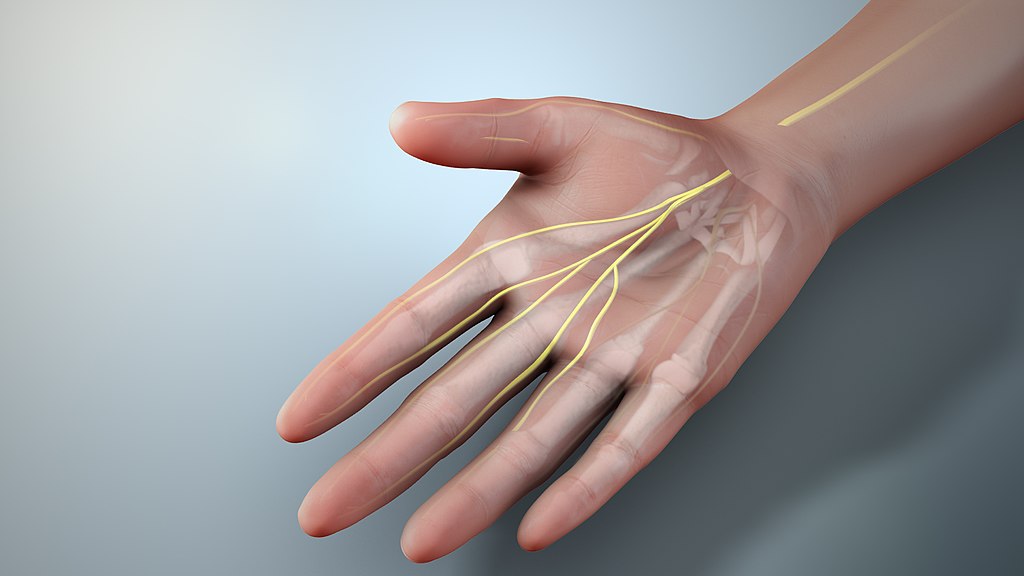Carpal Tunnel Syndrome (CTS) is a condition that affects approximately 50 out of every 1000 people. It is the leading nerve entrapment issue, making up 90% of all nerve problems outside the brain and spinal cord. CTS occurs when the nerve inside the carpal tunnel—a narrow channel on the palm side of your wrist—gets compressed, leading to symptoms like numbness, tingling, and weakness in the hand and arm.
For those with mild or moderate CTS, modifications in how they use their wrist can often provide relief. Simple actions such as resting the hands, avoiding activities that strain the wrist, and wearing wrist splints may mitigate symptoms. If these interventions don’t help, patients may consider surgery to alleviate nerve pressure.

Several factors can amplify the likelihood of nerve damage in the palm. Medical factors include anatomical changes in the carpal tunnel, chronic diseases like diabetes and rheumatoid arthritis, obesity, and conditions such as kidney disease. Occupational risks, like using vibrating tools or repetitive hand movements, can also be contributors.
Though these risk factors are associated with CTS, establishing a concrete clinical link between them and CTS has been challenging for researchers. However, a recent study in the Journal of Occupational and Environmental Medicine has brought forward an intriguing correlation: the relationship between cardiovascular disease risks and various musculoskeletal disorders, including CTS.
| This post may interest those with a higher polygenic risk score for cardiovascular disease or carpal tunnel syndrome. |
The Study
The research involved over 1000 participants from 17 facilities in Illinois, Utah, and Wisconsin. These participants, with an average age of 42 and predominantly female, came from diverse professional backgrounds. They include manufacturing, healthcare, office roles, and food processing. Their participation involved filling out demographic surveys, undergoing structured health interviews, two physical exams, and nerve conduction studies (NCSs). Researchers then tracked these participants for symptoms of CTS and other musculoskeletal disorders.
To provide a holistic view, the researchers also studied potential occupational risk factors by analyzing video footage of the participants’ work tasks. They integrated this data into the primary study’s statistical analysis.
Cardiovascular risk was assessed by taking into account various factors like age, gender, tobacco use, diabetes, and hypertension—both treated and untreated.
Results
At the outset, the study revealed that occupational strains presented a moderate risk for developing musculoskeletal disorders. However, a striking finding was the correlation between cardiovascular risk scores and the likelihood of these disorders. Individuals with the highest 10-year cardiovascular risk scores were over four times more likely to develop a musculoskeletal disorder than their counterparts. Furthermore, those with elevated cardiovascular risk scores showed a considerably higher chance of having multiple musculoskeletal disorders.
These findings suggest that cardiovascular disease risk factors may not only predispose individuals to issues like CTS, but conditions like CTS might also hint at early cardiovascular problems.

However, the study had its limitations, such as a lack of randomization, unmeasured lipid levels, and a concentration on specific occupations. The authors also faced challenges in accounting for age beyond its significance in the cardiovascular risk score calculation.
Despite these constraints, the researchers are optimistic about the implications of their findings and anticipate further studies to validate these connections and explore potential preventive measures.
Citation
Hegmann KT, Thiese MS, Wood EM, Kapellusch J, Foster JC, Drury DL, Kendall R, Merryweather AS. Cardiovascular Disease Risk Factors Predict the Development and Numbers of Common Musculoskeletal Disorders in a Prospective Cohort. J Occup Environ Med. 2023 Aug 1;65(8):e527-e533. doi: 10.1097/JOM.0000000000002895. Epub 2023 Jun 2. PMID: 37264528.
